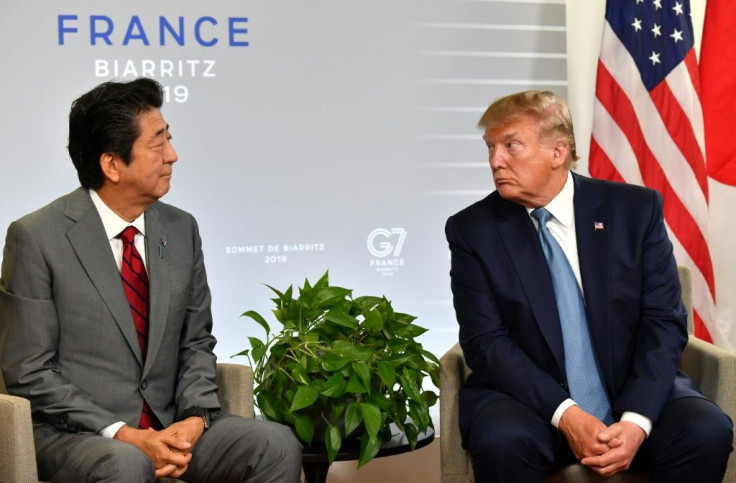US-Japan Trade Deal Hits Road Block Over Autos

US President Donald Trump and Japanese Prime Minister Shinzo Abe were due to unveil a new free trade pact to great fanfare on the sidelines of the UN General Assembly on Wednesday but last minute issues may delay signing the final agreement.
Wielding the threat of tariffs, Trump has sought a trade deal that will scale back the US trade deficit with Japan and benefit American farmers -- a key base of political support.
But negotiators may have stumbled over the sensitive issue of cars, according to Japanese media.
In exchange for a significant reduction in tariffs on US agricultural products, including beef and pork, Tokyo is demanding a firm commitment that Trump will not impose 25 percent tariffs on autos, which are vital for the sluggish Japanese economy, according to the reports.
Last year, the total US trade deficit with Japan was $58 billion, and Japan exported $51 billion worth of cars to the American market, according to government data.
US trade officials have been largely silent about the details of the expected deal. But hanging over the negotiations is Trump's November 17 deadline to decide whether to go ahead with stiff punitive duties on car imports from Japan as well as from the European Union -- a prospect that worries Germany.
In his address to the United Nations on Tuesday, Trump, who faces reelection next year, hailed the agreement with Tokyo.
"Tomorrow, I will join Prime Minister Abe of Japan, in continuing our progress and finalize a new trade deal," he said.
- Agreement or statement?
Trump announced a "deal in principle" with Tokyo in late August after only four months of negotiations, but at the time Abe cautioned that there remained work to do, especially in "finalizing the wording."
Following a meeting on Monday with US Trade Representative Robert Lighthizer, Japanese Foreign Minister Toshimitsu Motegi said negotiations were complete.
"It's finished," he said on Japanese television.
But while the official said he expected "a good ceremony at the summit meeting" on Wednesday, he did not mention whether the leaders would sign the final pact.
Japanese news media, citing sources close to the talks, reported that the terms of the treaty are still under discussion, subject to the scrutiny of the lawyers in the two capitals.
A New York Times report said signing of the deal could be delayed over the car issue, also citing sources familiar with the negotiations.
That report said Tokyo wants to include a "sunset clause" that would void the agreement and all the benefits granted to American farmers if Trump went ahead with auto tariffs. But Washington has balked at that demand.
With the details still up in the air, Trump and Abe may issue a joint statement in New York, as negotiators continue to work on the final agreement, according to the report.
A White House spokeswoman on Monday said she expected the leaders to be "signing something in (the) next couple of days."
Helping farmers
American farmers and ranchers are especially eager for even a limited trade deal, since they are highly dependent on export markets.
Japanese consumers bought a quarter of American beef and pork exports last year, $1.6 billion in pork and more than $2 billion worth of US beef.
At the end of August, the National Cattlemen's Beef Association said removing Japan's "massive" 38.5 percent tariff on American beef as part of a trade deal would "level the playing field."
The biggest agricultural export to Japan, however, remains corn which amounted to $2.8 billion in 2018.
"Japan is a very big deal for us," economist Veronica Nigh, of the American Farm Bureau Federation, told AFP.
Without it "we could see some pretty sizable shifts by next year," with US producers losing market share in Japan.
Trump pulled out of the Trans-Pacific Partnership upon taking office, saying he could get better deals in bilateral trade negotiations. But that left American farmers on the sidelines.
Trump has failed to make much progress in the trade war with China, and farmers have borne the brunt of Beijing's retaliation. Meanwhile, the world has moved on with agreements between the Japan and the European Union that favor EU agricultural goods.
© Copyright AFP 2024. All rights reserved.





















